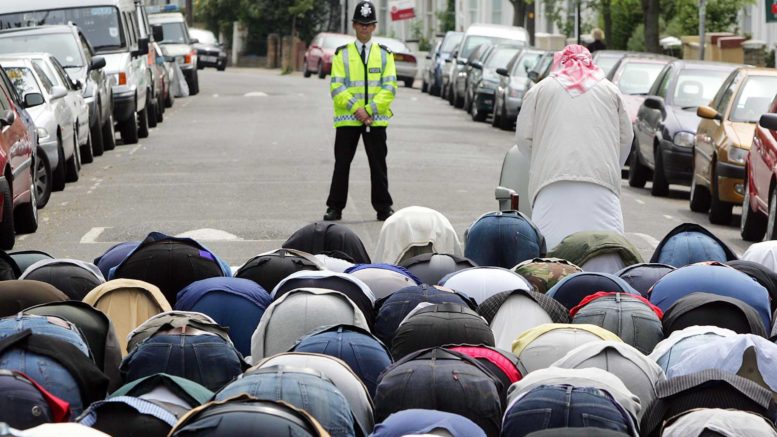An interesting article has turned up on the Raedwald blog. The blogger points out that although it’s good that the survey shows that a large number of Muslims consider themselves integrated with the rest of British society, it also shows there are still baleful problems with Saudi mosque funding and with the influence of Salafist and Deobandi Islamic preachers.
Raedwald said:
A major survey by Policy Exchange has a number of key findings. Central and positive is the desire of many Muslims in the UK to integrate, and the number who identify as ‘British’ as well as Muslim is encouraging – but what remains of concern is the extent to which they think Britain should change to accommodate Islam.
However, the report also highlights the pernicious effect of Saudi funding and in particular of the evil, divisive and Islamist effects of Deobandism, Salafism and Wahhabism in the UK. The survey found that 71% of Muslims ‘identify with their mosque and see it as representing their views’ – a worrying high percentage if applied to the radical Saudi sponsored mosques promoting Islamist terrorism. Saudi denials of its involvement in 9/11 are clearly finding a hearing in the Moslem community – some 31% of Muslims think the US was responsible for the terrorist atrocity, 7% blame the Jews and only 4% admit that an Islamist terror organisation of Saudi origin was responsible.
Whilst the majority of British Muslims are peaceable and responsible citizens, there are concernedly high percentages of those advocating violence, Sharia and Islamism in the UK, in complete contravention of the rules laid down by the government. A worrying percentage – 26% – deny that there is any extremism in the UK at all.
It’s not good that so many Muslims identify with their mosque, especially with the influence of Saudi Wahhabism and South Asian Deobandism on all too many of Britain’s mosques. It’s shocking that only 4% of British Muslims admit that an Islamist terror organisation had any thing to do with 9/11 and that represents an appalling level of denialism among Muslims in the UK. It’s also worrying to see the old ‘the Jews did 9/11’ bullshit still getting 7% support among UK Muslims. It’s a matter of especial concern to see so many Muslims (approx 33%) believing that 9/11 conspiracy theories have some element of truth contained within them. It’s also worrying to see that higher levels of education are no barrier to belief in conspiracy theories. Just as adherence to Islamic terror organisations is not confined to the poorly educated so also are tin foil hat theories about 9/11 etc.
Although there are many individual Muslims who are indeed peaceable and responsible, that should not mean that we should close our eyes to a growing current of acceptance of those advocating Shariah along with the violence and oppression that accompanies Shariah. This ‘concernedly high percentages’ in Raedwald’s words of Muslims holding these views and attitudes in my view doesn’t bode well for the future.
If there is any bright spot at all in this it is a a recognition by Muslims that some of the more gobby and extreme groups such as the Muslim Council of Britain don’t represent them or their personal views on religion. If people are rejecting the headcases of the MCB then that is a good thing.
I’m not sure how accurate this survey is or even how honest the contributors have been when speaking to the survey interviewers, As with all surveys we also have no idea how many of those interviewed may have given answers that they feel might be expected of them either. There are many people out there, non Muslims included who may feel that they may not wish to give answers that seem outlandish or which may be considered as ‘wrong’ and I wonder if this has been taken into account by those who put together this report.
On that subject I need to say that this is very much an ‘Establishment’ report, put together by Establishment academics and co-authored by a Labour MP. With these Establishment credentials in mind you do have to wonder whether those surveyed may have felt a little intimidated by the researchers and are giving answers that don’t ‘rock the boat’? For example how many people out there who are genuinely racist or anti-Semitic would, when confronted with Establishment academics tick the boxes that said ‘yes I’m a racist’ or ‘yes I hate Jews’? Not many I would guess. Another anomaly that I noticed was the high number of people answering ‘don’t know’ to some questions. It is not good that so many people have no opinion on really important and vital things.
Another thing I noticed was that the report writers seemed to expect that anti-Muslim bigotry would be much more of a problem than the survey showed it to be. That is going to be bad news for various Islamic grievance mongers such as the Tell Mama organisation who rely on hyping up ‘Islamophobia’ and anti-Muslim bigotry in order to fill their coffers with taxpayer cash. The relevant section of the report on this issue reads thus:
Against this, there is undoubtedly a perception – expressed often in more anecdotal fashion – that Muslims face challenges posed by anti-Muslim bigotry and racism. It is striking that this issue did not loom as large in the quantitative survey. It is also notable how concerns about these problems were often relayed with reference to stories heard from friends, family, or via the media. None of this is not to deny the reality of anti-Muslim abuse and discrimination. But it does illustrate that often this is at least as much perceived, as experienced. Here, as much as elsewhere, narrative is everything.
On this issue I will say that perception can often be very much divorced from the reality of a situation. The issue of ‘perception’ goes some way to explain why groups like Tell Mama have to hype up relatively minor molehill problems and a small number of actual attacks on Muslims, into a mountain of ‘Islamophobia’. It is further evidence to show that ‘hate crime’ and ‘hate speech’ offences that rely on the alleged victim’s ‘perception’ of the nature of any attack that has been made on them may not be at all a reliable thing to base prosecutions on. Maybe it’s time to banish permanently the idea that if you perceive that you are a victim of a hate crime than then you are in fact a victim of a hate crime? It certainly seems the sort of unreliable evidence that should not be relied upon in British courts.
I agree that there are positive things in this report, it would be dishonest of me to say otherwise, but we must not let this positivity, even if it be genuine, blind us to the fact that there are an awful lot of problems with putting unreformed Islam into ostensibly free and open societies. If there is one thing I take away from the report is that the state’s adherence to the ideology of Multiculturalism is making the problems of Islamic separatism and therefore individual Muslim’s vulnerability to radicalisation much, much worse. I wonder if the current level of Islam and Muslim related problems that the UK has would be the same had Britain instead of multiculturalism, embarked on a muscular policy of assimilation?
To conclude: I’m someone who believes in religious freedom and who doesn’t want to have ‘a window on men’s souls’. However much of the theology and a number of the social and political manifestations of Islam are at best troubling and at worst downright dangerous for heterodox Muslims, ex-Muslims and to the rest of us. Although there are good things in this report that doesn’t negate the fact that Britain has an ‘Islam problem’ and if it takes the closing of mosques, the licensing of Imams or even the selective removal of citizenship from troublesome Muslims and their exile from the UK to solve these problems, then we should do it and say political correctness be damned.
Links
Original article from the Raedwald blog
http://raedwald.blogspot.co.uk/2016/12/major-survey-shows-danger-of-saudi.html?spref=tw
The aforementioned report on British Muslim attitudes
https://policyexchange.org.uk/wp-content/uploads/2016/12/PEXJ5037_Muslim_Communities_FINAL.pdf





There are undoubtedly many basically good people who have been brought up Muslim but they behave reasonably at the moment despite Islam, not because of it.
Once the Muslim population reaches a critical mass then even a relatively small number of Islamic psychos can push the “moderate” Muslim into, at the very least, turning a blind eye towards the oppression of non-Muslims and the imposition of the harshest sharia law. At worst those “moderates” will be gradually pushed and/or converted into committing more extreme acts.
Many Muslims, for example those who work in my local cafe, couldn’t be more pleasant at the moment. If a tipping point is reached though and they need to decide one one way or another I have no confidence that they will either stand shoulder to shoulder with non-Muslims against the psychos or even help the non-Muslim to hide in an attic.
At the beginning of the 1930s, and even despite losing WW1 and and plunging into the Great Depression, few would have predicted how the vast majority of pleasant, decent non-psycho Germans would behave within such a very short time – and the adults weren’t even brought up in a culture which indoctrinated them into fascism from birth..